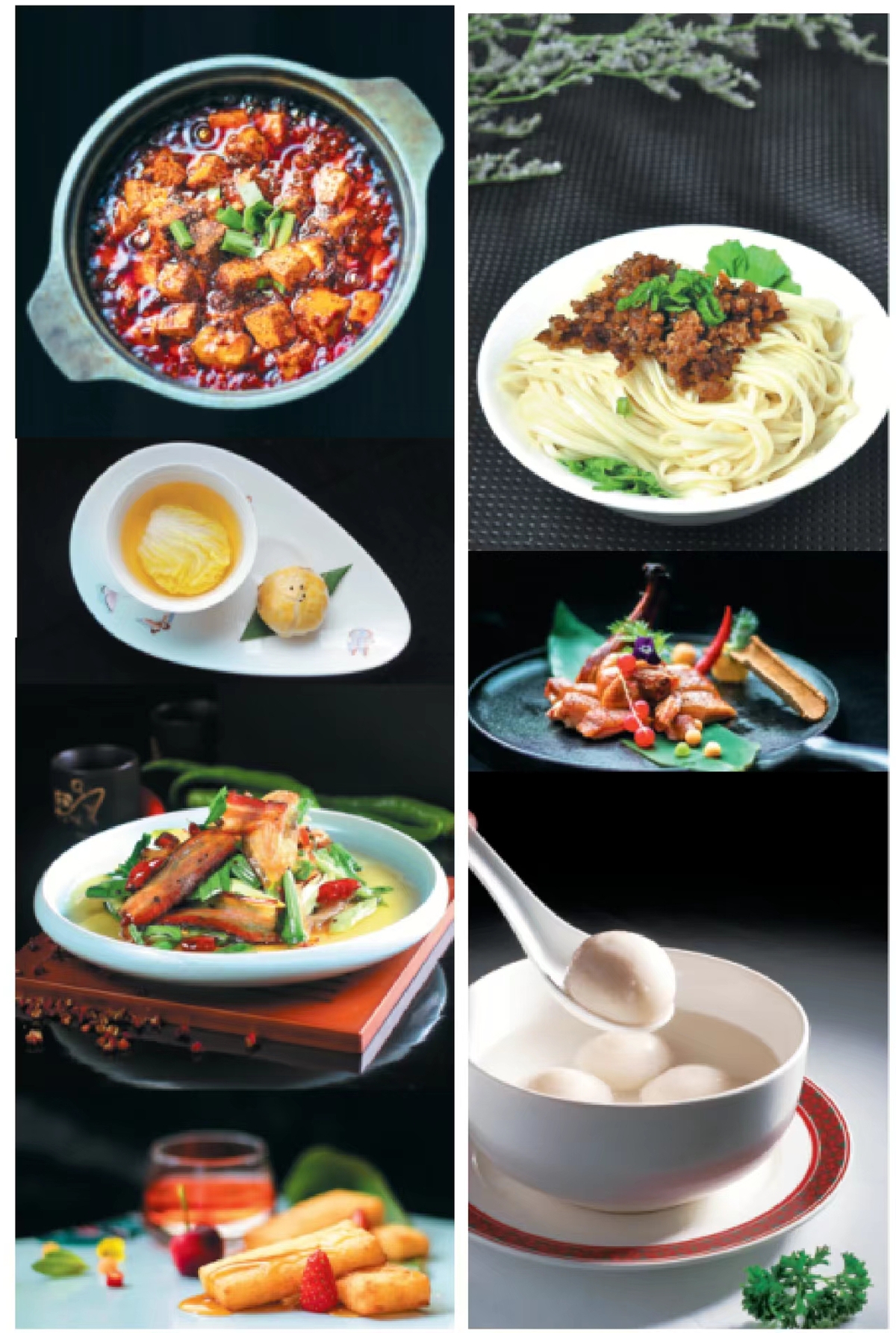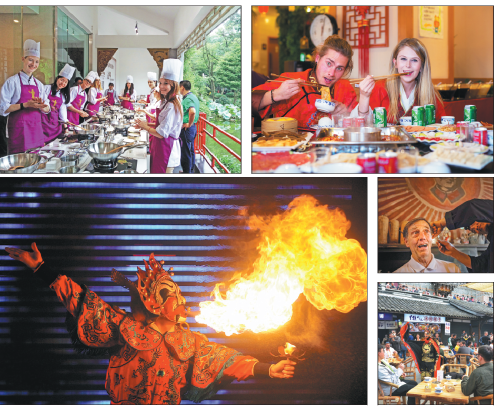Spicing up Chengdu's calling card to the world

Sichuan cuisine has earned the city international acclaim

Sichuan cuisine, renowned as one of China's eight great regional culinary fares, is enhancing Chengdu's international profile as the city continues its stride toward more openness.
Sichuan cuisine, which was developed as early as the Western Han Dynasty (206 BC-AD 24), began flourishing during the the Tang Dynasty (618-907) and the Song Dynasty (960-1279) and is celebrated in the works of venerated ancient Chinese poets Du Fu and Lu You. In recognition of that history, in 2010, the United Nations Educational, Scientific and Cultural Organization named Chengdu a "City of Gastronomy", making the capital of Southwest China's Sichuan province the first city in Asia to be accorded that honor.
The development of Sichuan cuisine is inseparable from the abundant resources of the Chengdu Plain, including fish, shrimp, crabs and turtles from the rivers and lakes, and wild delicacies from the mountains. Seasonal vegetables and mushrooms, along with tender poultry and livestock and an abundance of high-quality brewing and seasoning ingredients round out the menu.
The Dujiangyan irrigation system on the Minjiang River in the northwest region of Chengdu Plain was built under the auspices of local governor Li Bing in 256 BC, and the area has been free from both droughts and floods ever since. During the Han Dynasty (206 BC-AD 220) and Tang Dynasty, Chengdu was one of the most prosperous trading cities in China and home to wealthy merchants who tirelessly promoted the development of Sichuan cuisine. As an important source of goods on the northern Silk Road and the starting point of the southern Silk Road, the city introduced crops such as cucumbers, walnuts, pomegranates and garlic through trading.
Modern Sichuan cuisine is largely the result of migrant intervention. During the late Yuan Dynasty (1271-1368) and late Ming Dynasty (1368-1644), there were large-scale migrations to Sichuan from provinces such as Hubei, Jiangxi, Fujian, and Guangxi, resulting in cultural exchanges between diverse culinary cultures that eventually produced Sichuan cuisine.
It is worth mentioning that just as modern Sichuan cuisine was taking shape more than three centuries ago, chili peppers from America were introduced to the region — an ingredient that gives Sichuan dishes their distinctive character to this day. According to a local guidebook published in 1909, the chilli peppers are used very frequently in 1,328 Sichuan-style recipes in the book.

While many people attribute the spicy, numbing taste of Sichuan cuisine to the liberal use of peppers, its actual essence has more to do with flavor diversity. Modern Sichuan cuisine emphasizes seasoning and has 24 different flavor profiles, but delicate dishes with no spicy or pronounced numbing flavors account for about two-thirds of them.
In recent years, as Chengdu has enhanced its profile on the world stage as the birthplace and development center of Sichuan cuisine, the city's culinary signature has also become more popular globally, showcasing its charm and vitality through international exchanges.
For many foreign political figures and celebrities, "interaction" with Sichuan cuisine is a must-have experience. When David Cameron was serving as prime minister of the United Kingdom, he visited Chengdu specifically to enjoy Sichuan tea and hotpot. Former United States' first lady Michelle Obama also sampled authentic Sichuan-style hotpot during her visit to Chengdu, and when former German chancellor Angela Merkel came to the city, she consulted a local chef on how to prepare classic Sichuan kung pao chicken.
Along with hotpot and kung pao chicken, Chengdu is the birthplace of Mapo tofu and is famous for its exquisite and diverse street snacks. And while enjoying their meal, diners at city restaurants are often treated to performances of unique Sichuan Opera skills such as face-changing and fire-spitting.
To experience the food scene in Chengdu, the Kuixinglou Street is a must-visit. Located in the downtown area, the street encompasses a 400-meter street lined with dozens of restaurants — most of which are overflowing with diners at mealtime. Chengdu locals, who consider eating a major part of life, are willing to wait for hours in long queues just to have a taste.
The irresistible flavors not only attract locals but also many tourists who have visited other attractions in Chengdu. Meanwhile, street vendors offer their signature snacks to satisfy people waiting for their meals. From egg custard cakes to sugarcoated glutinous rice dumplings and ice jelly, visitors can find almost all authentic Chengdu snacks in this area.
Another preferred destination is Yulin Street. Made popular by the song Chengdu by Zhao Lei, the street is home to small bars and a food paradise featuring scrumptious barbecue and hotpot, skewers, roasted rabbit and crayfish. The dozens of streets and lanes are home to cozy outlets where you can find everything from the most casual fare to luxurious dining experiences.
Xiangxiang Alley on Wangping Street is another great late-night stop for famished foodies. It offers a diverse range of cuisines, including Sichuan dishes, hotpot, barbecue, Western food, Thai food, desserts, teahouses and bars. Meanwhile, Jinli is an ancient street featuring traditional Sichuan-style architecture and Chengdu delicacies. Here visitors can also enjoy Sichuan folk and opera performances and browse souvenir shops.
Chunxi Road in Chengdu's city center is a bustling commercial street known for high-end shopping and entertainment, and its restaurants feature a variety of Sichuan specialties, including rabbit head, roasted pig trotters and spicy rice noodles.
For nighthawks, the Jiuyan Bridge on Jinjiang River is home to dozens of bars and serves as the after-dark hub of Chengdu. The bars vary in size, with some only accommodating a few tables. Most offer both indoor and outdoor seating, and when night falls, the entire street reflects in the glittering river, creating a beautiful spectacle.
Most Popular
- Master of Shanghai: Fans flood Djokovic with love
- Muchova defeats injured Zheng to meet Gauff
- Grandma Ni inspires at WTT China Smash with resilience and heart
- A great spot to hang out
- China's rise as a dual Olympic host and global sports power
- Chinese men start to smash it!





























